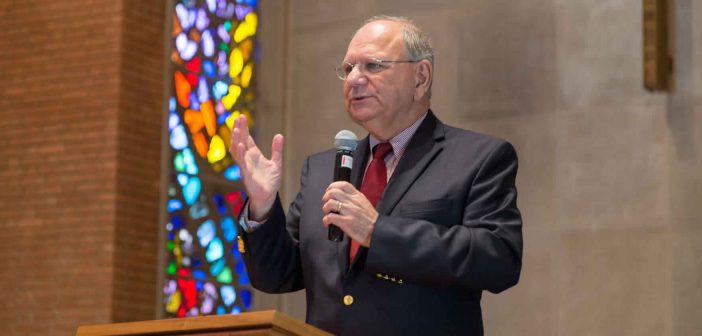Lovett H. Weems, Jr., founding director of the Lewis Center for Church Leadership, recently shared leadership ideas particularly influential in his own ministry. His top five leadership lessons underscore an approach to leadership that is centered on others and directed toward God’s ultimate will, even when the first faithful step is an incremental one.
I have often said, “I don’t have many good ideas, but I know how to recognize them.” These five leadership principles that have shaped my own ministry demonstrate how indebted my understanding of leadership is to so many others.
1. Leadership Begins with the People God Has Given Us
Fifty years ago, I heard Martin Niemoeller speak in the Oxnam Chapel of Wesley Theological Seminary. Niemoeller was a contemporary of Dietrich Bonhoeffer and, like Bonhoeffer, was imprisoned by Adolf Hitler. He spent seven years in prison and, unlike Bonhoeffer, lived until the prison was liberated in 1945. It was from Niemoeller that I learned the phrase, “the people God has given us.” That concept has helped me with one of the essential tenets of leadership. Leadership is always about a group and never about the leader. The group may be a ball team, a choir, a congregation, or a nation. For religious leaders, the beginning point is always with “the people God has given us” and not with us.
The question is not so much whether someone is a leader but whether they are “leading” at a particular time. All of us have leadership potential, but it is effective only when leading is taking place.
2. Leadership is Helping God’s People Take the Next Faithful Step
Scott Cormode, now on the faculty at Fuller Theological Seminary, was teaching at Claremont School of Theology when I first heard his definition of leadership as “helping God’s people take the next faithful step.” Not only does this approach to leadership assume that leadership begins with a group; it also recognizes that leadership is always about change — and is change for theological reasons. The current state of things is never synonymous with God’s ultimate will. No matter how good you feel about your congregation, you surely cannot say, “We are so good that we’ve now become all that God ever intends for us to be.” The unspoken mission of many churches is to “stay as good as we are.” That makes no sense theologically. We cannot become what we need to be by remaining what we are.
Dr. Weems delivered these remarks to a gathering celebrating his tenure as founding director of the Lewis Center for Church Leadership. The event was held on September 28, 2017 at Wesley Theological Seminary in Washington, DC.
3. The Next Faithful Step May Not Be the Next Big Step
My first appointment out of seminary was to an open country church in southwest Mississippi. There I discovered quickly that assumptions we seminary students had discussed a few weeks before might not be accurate. Ideas we assumed had been dead for many years were alive and well. In many places where we might serve, no one had considered that those old ideas might change. If I were going to begin with “the people God has given me,” then this context had to have a claim on me beyond my personal beliefs and preferences. I had to take seriously where I was. Addressing the context where I found myself could have seemed a small thing to the casual observer, but, for me, it was doing exactly what God had called me to do as long as I was pastor there.
4. “Leading” May Be a Better Word than “Leadership”
People frequently ask me who I see as great leaders. I’m never comfortable with that question because I’m not sure it tells us what we need to know about leadership. For example, in the twentieth century, I think Winston Churchill was in many ways a great leader. But not always. There were times in which he was “leading” and times when he was not. Yet he was the same person. Therefore, the question is not so much whether someone is a leader but whether they are “leading” at a particular time. Similarly, all of us have leadership potential, but it is effective only when leading is taking place. I suggest that you don’t spend time trying to identify a few leaders. Focus on whether everyone is leading appropriately at the moment.
5. In Groups There is More Power for All to Have
Too often we think of organizational power as a limited, fixed sum. We imagine it works like slicing a pie. If someone takes a larger piece, it leaves less for everyone else. When we operate with power seen as a fixed sum, we feel a need to protect our own power. We think the only way for laity to be stronger in a congregation is for the pastor to have less power, and the only way for a pastor to have more power is to constrain the influence of laity.
The reality is just the opposite. In my experience, power within groups is an expandable sum in which the pie itself can get larger. The more willing I am to be influenced by you, the more likely you are to be influenced by me. In a congregation where laity feel most influential, it is not unusual for them to speak often about their pastor’s significant role. By the same token, pastors who exercise strong leadership often are quick to acknowledge the crucial contributions of laity. As each is influenced by the other, they become more open to genuine mutual influence that creates more power for everyone. All are called to be strong together.
Related Resources
- Church Leadership: Vision, Team, Culture, Integrity, Revised Edition (Abingdon Press, 2010) by Lovett H. Weems, Jr.
- Ten Leadership Lessons from Nehemiah by Lovett H. Weems, Jr.
- Leadership is Always about Others by Lovett H. Weems, Jr.







